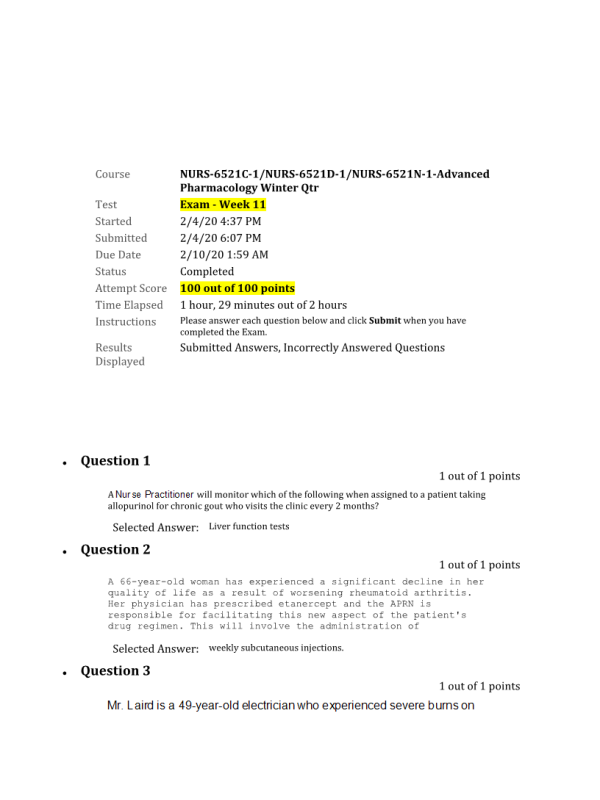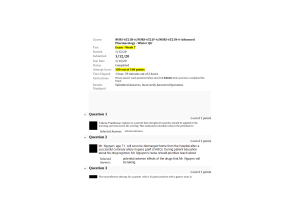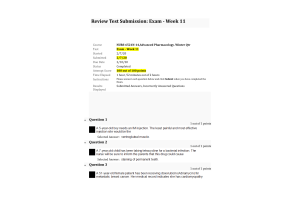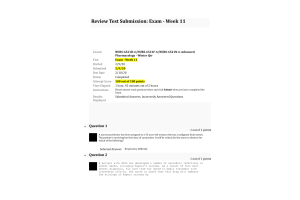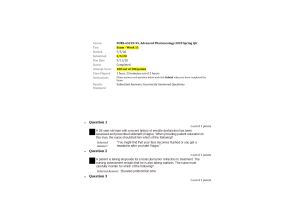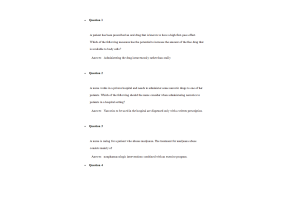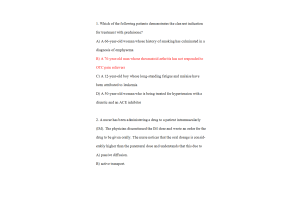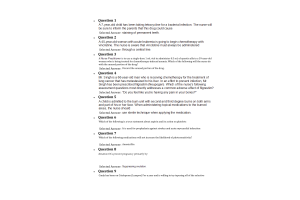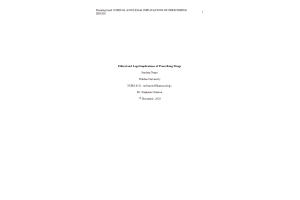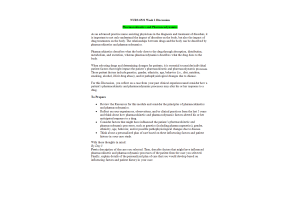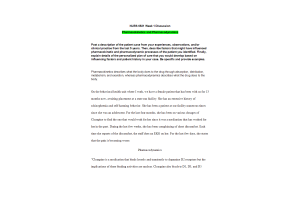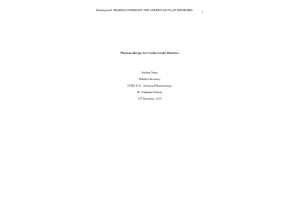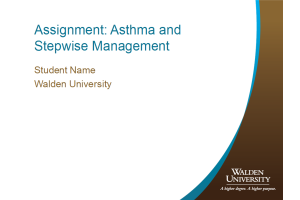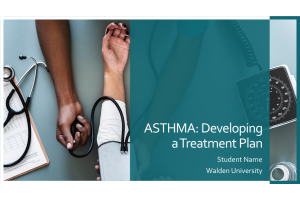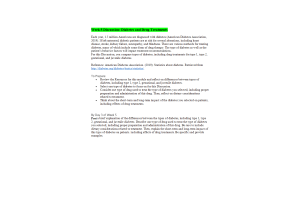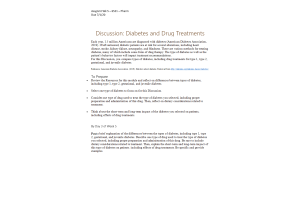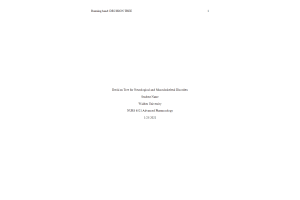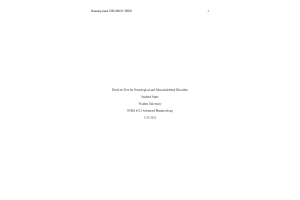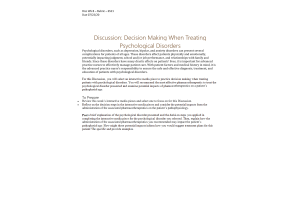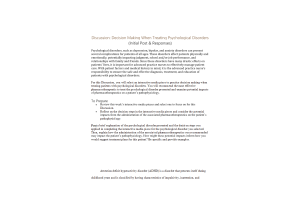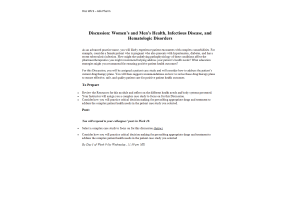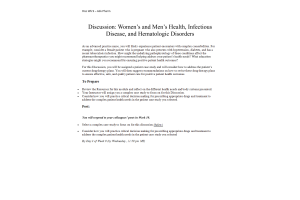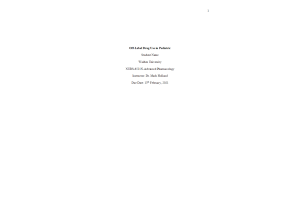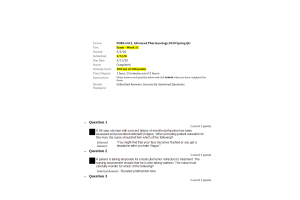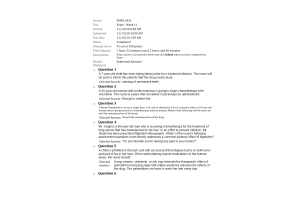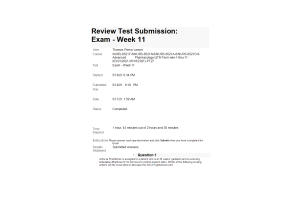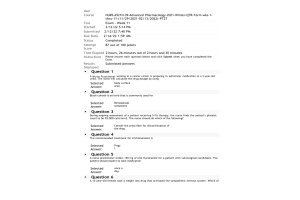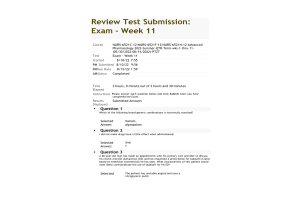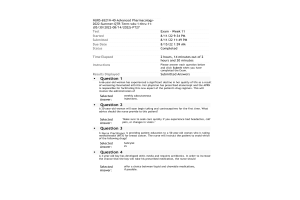NURS-6521C-1, NURS-6521D-1, NURS-6521N-1 Exam - Week 11 Final100 out of 100 Points
- $69.00
NURS 6521 Advanced Pharmacology
- Question: A Nurse Practitioner will monitor which of the following when assigned to a patient taking allopurinol for chronic gout who visits the clinic every 2 months?
- Question: A 66-year-old woman has experienced a significant decline in her quality of life as a result of worsening rheumatoid arthritis. Her physician has prescribed etanercept and the APRN is responsible for facilitating this new aspect of the patient's drug regimen. This will involve the administration of
- Question: Mr. Laird is a 49-year-old electrician who experienced severe burns on his trunk, arms, and hands in a workplace accident 2 weeks ago. Part of his current wound care regimen involves the daily application of silver sulfadiazine to his wounds. The nurses who are providing care for Mr. Laird in the burns and plastics unit of the hospital should perform what action when administering this medication?
- Question: A 3-year-old boy has developed otitis media and requires antibiotics. In order to increase the chance that the boy will take his prescribed medication, the nurse should
- Question: A 67-year-old man who is being treated for prostate cancer is taking epoetin alfa. The nurse will instruct the patient to
- Question: A Nurse Practitioner is caring for a 64-year-old female patient who is receiving IV heparin and reports bleeding from her gums. The nurse checks the patient's laboratory test results and finds that she has a very high a PTT. The nurse anticipates that which of the following drugs may be ordered?
- Question: A 13-year-old patient has juvenile arthritis. He has recently had oral surgery and was told by the surgeon to take aspirin for the pain. The APRN will monitor for which of the following?
- Question: A Nurse Practitioner is working with a 16-year-old pregnant teen and assessing for behavior that may put the baby at risk. The most important assessment the nurse can make is
- Question: The recommended treatment for trichomoniasis is
- Question: A Nurse Practitioner is caring for a patient who is at 28 weeks' gestation and is receiving terbutaline (Brethine) to control preterm labor. Which of the following assessment parameters should the nurse prioritize?
- Question: A 34-year-old male has been diagnosed with TB and will be started on INH therapy. The medication history reveals that he currently takes antacids on a regular basis. The nurse will instruct the patient to take
- Question: An older adult woman has been diagnosed with acute lymphoblastic leukemia (ALL) and her care team has identified potential benefits of imatinib. Which of the following characteristics of this patient's current health status may preclude the use of imatinib?
- Question: A 9-year-old boy was bought to his primary care provider by his mother with signs and symptoms of hookworm infection and will be sent home with a prescription for mebendazole. When provided patient and family education, the nurse should teach the mother with which of the following measures to avoid reinfection following treatment?
- Question: A Nurse Practitioner is caring for a 10-year-old boy who complains of chronic headaches. His mother reports that she gives him Tylenol at least three times a day. Which of the following will the nurse work with the physician to evaluate?
- Question: A patient with chronic heart failure has begun treatment with epoetin alfa, which she will receive in her own home from a home health nurse. The nurse should teach the patient to supplement this treatment with a diet that is high in
- Question: A patient with a recent diagnosis of chronic myelogenous leukemia (CML) is discussing treatment options with his care team. What aspect of the patient's condition would contraindicate the use of cyclophosphamide for the treatment of leukemia?
- Question: A 72-year-old patient is prescribed ophthalmic ciprofloxacin for a bacterial infection in her right eye. The nurse will teach her to observe for which of the following adverse effects of the drug?
- Question: A 46-year-old man is receiving a quinupristin/dalfopristin IV infusion for a life-threatening infection. Which of the following would be most important for the nurse to monitor?
- Question: A Nurse Practitioner educator who coordinates the staff education on an oncology unit is conducting an inservice on targeted therapies. What potential benefit of targeted therapies should the nurse highlight in this education session?
- Question: A 15-year-old patient has meningitis caused by Hemophilus influenzae. She is being treated with chloramphenicol. The most important nursing action for this patient would be to monitor
- Question: A patient has been prescribed oral tetracycline. The nurse will instruct the patient to take the drug
- Question: Mr. Singh is a 66-year-old man who is receiving chemotherapy for the treatment of lung cancer that has metastasized to his liver. In an effort to prevent infection, Mr. Singh has been prescribed filgrastim (Neupogen). Which of the nurse's following assessment questions most directly addresses a common adverse effect of filgrastim?
- Question: Morphine has been prescribed for a 28-year-old man with severe pain due to a back injury. The nurse will advise the patient to avoid
- Question: Intravenous carmustine has been prescribed for a patient with cancer. The nurse should help relieve the discomfort of pain and burning during the infusion by
- Question: A 73-year-old woman has osteoporosis and is prescribed alendronate. She takes calcium and vitamin D supplements, drinks lots of water, and has just quit smoking. The nurse should advise the patient to also
- Question: A 38-year-old pregnant patient admits to the Nurse Practitioner that she is an alcoholic and has been consuming alcohol during her pregnancy. The nurse knows that using alcohol during pregnancy may result in a child who presents with
- Question: A 7-year-old child has tonsillitis and is prescribed penicillin V, which is to be administered at home. The nurse will instruct the parents to administer the drug
- Question: A 71-year-old man has just been prescribed finasteride (Proscar). Which of the following complaints by this patient most likely indicated a need for this drug?
- Question: A patient has endocarditis and is taking gentamicin. The Nurse Practitioner will be sure to monitor which of the following?
- Question: A 51-year-old female patient has been receiving doxorubicin (Adriamycin) for metastatic breast cancer. Her medical record indicates she has cardiomyopathy and a cumulative dose of 300 mg/m2 of doxorubicin. Which of the following measures would help limit the severity of the cardiomyopathy in this patient?
- Question: A patient is to begin taking tobramycin (Nebcin) for a nosocomial infection. Which of the following assessments should the nurse prioritize?
- Question: A patient with AIDS has developed a number of secondary infections in recent weeks, including Kaposi's sarcoma. As a result of this most recent diagnosis, his care team has opted to begin treatment with interferon alfa-2a. The nurse is aware that this drug will address the etiology of Kaposi sarcoma by
- Question: A 16-year-old boy is prescribed cromolyn sodium nasal spray to treat a nasal allergy. To maximize the therapeutic effects of the drug, which of the following will the nurse include in instructions to the patient?
- Question: Alprostadil (Caverject), a drug used to treat erectile dysfunction, has been prescribed to a 42-year-old patient. When providing education to the patient and his wife, the nurse should inform the wife about which of the following adverse effects?
- Question: A 56-year-old woman will soon begin treatment of her overactive bladder with tolterodine (Detrol). What patient teaching should the nurse provide to this woman?
- Question: A 54-year-old woman with a history of osteoporosis has been prescribed ciprofloxacin for recurrent cystitis. Because of the patient's history, the nurse would be sure to discuss with the woman the use of
- Question: An immunocompromised 7-year-old child was recently discharged home with a peripherally-inserted central line (PIC line) for home antibiotic therapy. He has now been brought to the emergency department by his mother and father with signs and symptoms of line sepsis. Upon questioning, the mother states that she has been removing the PIC dressing daily and washing the site with warm water and a cloth. What nursing diagnosis is most appropriate in this situation?
- Question: A 12-year-old boy is being discharged from the hospital after major surgery. The boy will be taking two medications at home for an extended period. The nurse who is discharging the patient should provide medication teaching specifically to
- Question: A pregnant patient who has diabetes has been admitted to the hospital to begin labor. Since the patient has diabetes, the physician has decided to use oxytocin (Pitocin) to initiate labor contractions. When talking to the patient about the adverse effects of the drug, the nurse should understand that the most common adverse effects of the drug include
- Question: A Nurse Practitioner is going to administer medication to an infant using a medicine dropper. The best method is to open the child's mouth by gently squeezing the cheeks and placing the drops
- Question: A nurse practitioner has been assigned to a 55-year-old woman who has a malignant brain tumor. The patient is receiving her first dose of carmustine. It will be critical for the nurse to observe for which of the following?
- Question: A 62-year-old patient taking tamoxifen exhibits increased bone and tumor pain along with a local disease flare. The nurse interprets this as an indication of which of the following?
- Question: A 45-year-old female patient is prescribed ciprofloxacin to treat a bronchial infection. A nursing assessment revealed that she started taking daily vitamin supplements about 2 years ago. To maximize the therapeutic effects of the ciprofloxacin therapy, the nurse should advise the patient to
- Question: A female patient is taking filgrastim (Neupogen) to decrease the incidence of infection. The nurse notices a small increase in the neutrophil count 2 days after starting therapy. The nurse's evaluation of the increase is that
- Question: A patient has completed 4 weeks of treatment with epoetin alfa. Which of the following assessment findings would most strongly indicate that treatment has been effective?
- Question: A Nurse Practitioner is instructing a 19-year-old female patient on the use of fluconazole for candida vaginitis. A teaching priority will be to
- Question: When planning care for a patient who is receiving filgrastim (Neupogen) for a nonmyeloid malignancy, the nurse should formulate which of the following patient outcomes?
- Question: An immunocompromised patient with a diagnosis of candidiasis has failed to respond to conservative therapy and has consequently begun treatment with amphotericin B. The nurse is aware that this drug achieves a therapeutic effect by way of its influence on
- Question: An elderly woman is slated for a hemiarthroplasty (hip replacement surgery) after falling and breaking her hip on the stairs outside her home. The woman's pain in the time since her injury has been severe, and her care team has been treating it with morphine. Which of the following administration schedules is most likely to control the patient's pain?
- Question: A patient has been admitted to the critical care unit of the hospital with bacterial septicemia that has failed to respond to initial antibiotic treatment. The patient's most recent blood cultures reveal the presence of methicillin-resistant Staphylococcus aureus (MRSA) in the patient's blood. The nurse will anticipate that this patient will likely require intravenous administration of what antibiotic?
- Question: A woman is receiving prolonged drug therapy during her complicated pregnancy, and it may pose a risk to both the mother and the fetus. The primary care physician has made dosage adjustments to minimize adverse effects and prevent toxicity. The nurse should make sure
- Question: A Nurse Practitioner will instruct a patient taking allopurinol to take each dose
- Question: The nurse practitioner orders Amoxicillin 500 mg tid? What is the total amount of medication patient will take per day?
- Question: A Nurse Practitioner who provides care on a pediatric medicine unit has conducted a medication reconciliation of a recently-admitted patient. In light of the fact that the child takes methylphenidate (Ritalin), the nurse is justified in considering a history of what health problem?
- Question: A 13-year-old female took a weight loss drug that activated the sympathetic nervous system. Which of the following assessment findings would the nurse expect?
- Question: A 43-year-old man has been diagnosed with active TB. He is prescribed a multiple drug therapy, including INH and rifampin. A priority assessment by the nurse will be to monitor which combination of laboratory test results?
- Question: A patient has been admitted to the critical care unit with a diagnosis of peritonitis that has necessitated treatment with gentamicin. As a result, the care team should be cautious when concurrently administering other medications that may cause
- Question: A Nurse Practitioner is aware that the concept of selective toxicity is foundational to antimicrobial therapy. Which of the following statements most accurately describes selective toxicity?
- Question: A 45-year-old woman with acute leukemia is going to begin chemotherapy with vincristine. The nurse is aware that vincristine must always be administered
- Question: Which of the following would the nurse include in a teaching plan about the signs and symptoms of thrombophlebitis and thromboembolism that should be reported by a patient taking estrogen?
- Question: A pregnant patient asks the Nurse Practitioner what over-the-counter medication she can take for recurring headaches. The nurse should recommend
- Question: A child is admitted to the burn unit with second and third degree burns on both arms and part of his or her face. When administering topical medications to the burned areas, the nurse should
- Question: A Nurse Practitioner is discussing with a 58-year-old male patient the causes of erectile dysfunction in men over 50 years of age. Which of the following will the nurse inform the patient is the primary physical cause of erectile dysfunction of men in this age group?
- Question: A postmenopausal patient is prescribed bisphosphonates to treat osteoporosis. The nurse will instruct the patient to take the drug
- Question: The Nurse Practitioner notices a cold sore on a patient's upper lip and requests medication; docosanol (Abreva) is ordered. Before applying the medication, the nurse would first
- Question: A Nurse Practitioner works at a weight management clinic. To which of the following overweight patients could the nurse safely administer dextroamphetamine?
- Question: A Nurse Practitioner is having difficulty administering a bitter drug to a 5-year-old child. The nurse should
- Question: An oncology nurse is aware of the risks for injury that exist around the preparation, transportation, and administration of chemotherapeutic agents. In order to reduce these risks of injury, the nurse should take which of the following actions?
- Question: A Nurse Practitioner is reviewing the prepregnancy medication regimen of a patient who has just had a positive pregnancy test. The nurse should be aware of which of the following changes in pharmacokinetics that accompanies pregnancy?
- Question: The Nurse Practitioner has established peripheral IV access and begun an infusion of magnesium sulfate on a 29-year-old antepartum patient who is 35 weeks pregnant. Which of the following assessment findings most likely prompted the patient's physician to order magnesium sulfate for this patient?
- Question: Which of the following would a Nurse Practitioner assess for in a patient who is taking polymyxin B systemically?
- Question: A patient is receiving cefazolin in combination with anticoagulants. To minimize the adverse effects during therapy, the nurse will
- Question: A male patient is experiencing climacteric symptoms secondary to androgen deficiency. His physician has prescribed testosterone. The nursing assessment reveals that the patient has had a myocardial infarction. The combination of testosterone therapy and a history of myocardial infarction would place that patient at a significantly higher risk of
- Question: A 30-year-old woman who is in the first trimester of pregnancy has presented to her primary care provider with a 4-day history of a reddened, itchy left eye that is crusted with purulent exudate. The clinician suspects a bacterial, rather than viral, etiology. How will the patient's pregnancy affect the potential use of ciprofloxacin to treat her conjunctivitis?
- Question: A man has a demonstrated history of androgen deficiency and the consequences of this health problem include an inability to maintain an erection. Which of the following medications would best address this patient's erectile dysfunction (ED)?
- Question: A 65-year-old woman has an advanced form of rheumatoid arthritis. Her treatment includes a regular dosage of methotrexate. The APRN will advise her to take which of the following vitamin supplements while taking the drug?
- Question: An immunocompromised patient in a critical care setting has developed a respiratory infection that has been attributed to methicillin-resistant Staphylococcus aureus (MRSA). The nurse should anticipate that the patient will require treatment with
- Question: A Nurse Practitioner is assessing a patient who has chronic lymphoblastic myelogenous leukemia. The treatment plan includes hydroxyurea (Hydrea). The nurse will assess the patient for which of the following?
- Question: A 29-year-old woman who is morbidly obese has recently begun a comprehensive, medically-supervised program of weight reduction. Prior to adding dextroamphetamine (Dexedrine) to her regimen, the patient should be questioned about her intake of
- Question: A male patient is trying to decide if he should use finasteride (Proscar) to treat benign prostatic hypertrophy (BPH). When providing information about the drug, the nurse will include which of the following as a risk associated with finasteride therapy?
- Question: A patient is taking rifampin (Rifadin) for active TB. When discussing this drug with the patient, the nurse should stress that
- Question: A 15-year-old boy who has been taking dextroamphetamine for the treatment of ADHD has been experiencing a depressed mood and a sense of hopelessness. He confides in the school nurse that he has begun taking his stepfather's antidepressant to improve his mood. After immediately phoning the boy's stepfather, the nurse learns that the drug in question is phenelzine (Nardil), a monoamine oxidase inhibitor (MAOI). The nurse should recognize that this combination of drugs creates a serious risk of what health problem?
- Question: A Nurse Practitioner is caring for a patient with cancer who has been prescribed dronabinol (Marinol) to help reduce nausea and vomiting from chemotherapy. The nurse will inform the patient that he or she is taking an oral form of
- Question: A Nurse Practitioner has completed a medication reconciliation of a patient who has been admitted following a motor vehicle accident. Among the many drugs that the patient has received in the previous year is rituximab. The nurse would be justified in suspecting the patient may have received treatment for which of the following diseases?
- Question: A Nurse Practitioner working in a cancer center is preparing to administer medication to a 5-year-old child. The nurse will calculate the drug dosage by using
- Question: An oncology nurse is reviewing the pathophysiology of cancer and is discussing with a colleague the factors that contribute to the success or failure of a patient's chemotherapy. Which of the following cancerous cells is most susceptible to the effects of chemotherapeutic drugs?
- Question: A woman is receiving magnesium sulfate for intrapartum eclampsia. The patient is perspiring and her blood pressure is 88/50. The serum magnesium level is 10 mg/dL. The nurse will interpret these manifestations as
- Question: A 35-year-old woman is on a weight-loss program and is to begin taking sibutramine (Meridia). After baseline physical data are obtained, the nurse will assess the patient's childbearing potential. The nurse will inform the patient that during sibutramine therapy she should
- Question: A 59-year-old man with a recent history of erectile dysfunction has been assessed and prescribed sildenafil (Viagra). When providing patient education to this man, the nurse should tell him which of the following?
- Question: A Nurse Practitioner is working with a 57-year-old man who is a former intravenous drug abuser. He has been prescribed a weekly dosage of methotrexate for his rheumatoid arthritis. Which of the following will the nurse include in her teaching plan for this patient?
- Question: A Nurse Practitioner is to use a single-dose 1 mL vial to administer 0.5 mL of epoetin alfa to a 39-year-old woman who is being treated for chemotherapy-induced anemia. Which of the following will the nurse do with the unused portion of the drug?
- Question: A school nurse has been teaching high school students about the risks associated with marijuana use. However, the nurse has been met with considerable skepticism on the part of students, most of whom believe that marijuana is a benign drug. Which of the following teaching points should the nurse provide?
- Question: A Nurse Practitioner has questioned why a patient's physician has prescribed a narrow-spectrum antibiotic rather than a broad-spectrum drug in the treatment of a patient's infection. Which of the following facts provides the best rationale for the use of narrow-spectrum antibiotics whenever possible?
- Question: After 6 months of unsuccessfully trying to conceive, a 31-year-old woman and her husband have sought a referral to a fertility specialist in order to explore their options. A nurse at the clinic should recognize that the woman may benefit from
- Question: A Nurse Practitioner is explaining to the parents of a 6-year-old child suffering from angina why nitroglycerin patches for chest pain would not be appropriate. Which of the following will the nurse include in an explanation?
- Question: Laboratory testing has confirmed that a patient has chloroquine-resistant malaria and the patient's physician has prescribed quinine along with an adjunctive drug. The nurse should question the physician's order if the patient has a history of
- Question: A Nurse Practitioner is assigned to a patient who is at 32 weeks' gestation and is receiving terbutaline (Brethine) IV for 24 hours to control preterm labor. Which of the following nursing actions will the nurse take to decrease the risk of hypotension and promote circulation to the fetus?
- Question: A nurse practitioner orders 150 mg of oral fluconazole for a patient with vulvovaginal candidiasis. The patient should expect to take medication
- Question: A 33-year-old man has developed acute gouty arthritis. He has been prescribed colchicine. When developing a care plan for this patient, which factor will be most important for the nurse to consider?
- Question: A patient has acquired primary hypogonadism and has been prescribed testosterone transdermal (Androderm) patches. When educating the patient on how to administer the drug, the nurse will instruct him to
- Question: When completing this exam, did you comply with Walden University’s Code of Conduct including the expectations for academic integrity?
